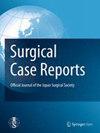Stage IV gastric cancer with microsatellite instability–high achieving long-term survival by gastrectomy after nivolumab as third-line therapy: a case report and literature review
IF 0.7
Q4 SURGERY
引用次数: 0
Abstract
The prognosis for stage IV gastric cancer remains poor; however, the advent of immune checkpoint inhibitors (ICIs) such as nivolumab has increased the number of patients with long-term survival. Patients with microsatellite instability (MSI)–high gastric cancer have been recognized as a highly effective population for ICIs. Herein, we report a patient with MSI–high advanced gastric cancer treated with gastrectomy after the administration of nivolumab as third-line therapy. A 73-year-old woman presented with a type 3 tumor in the lower part of the gastric body, which was diagnosed as gastric cancer through biopsy. Staging laparoscopy revealed that the tumor had invaded the pancreas and the posterior lobe of the transverse mesocolon, and disseminated nodules were found near the ligament of Treitz. After 4 courses of S-1 plus cisplatin therapy, laparoscopic gastrojejunal bypass was performed because of difficulty in oral intake. She received S-1 plus oxaliplatin therapy after a gastrojejunal bypass; however, her regional lymph nodes were enlarged. After six courses of paclitaxel plus ramucirumab as second-line chemotherapy, computed tomography (CT) showed exacerbation of peritoneal dissemination; thus, nivolumab was selected as the third-line therapy. The tumor was characterized by MSI–high. At 24 courses, CT and gastroscopy revealed a complete clinical response of the tumor; however, re-growth of the primary tumor was observed at 36 courses. The patient underwent distal gastrectomy with D1 + lymph node dissection, and received S-1 monotherapy as adjuvant therapy for 1 year. No recurrence was noted at 39 months after the surgery. We report a patient with highly advanced gastric cancer with peritoneal dissemination, which worsened during second-line therapy and was successfully treated with gastrectomy after nivolumab administration as a third-line therapy. MSI–high gastric cancer is a target that should be actively considered for the administration of ICIs, such as nivolumab, and multidisciplinary treatment combined with chemotherapy and gastrectomy, including conversion surgery, can lead to patients’ long-term survival.微卫星不稳定的IV期胃癌--尼妥珠单抗作为三线疗法后通过胃切除术获得长期生存:病例报告和文献综述
IV 期胃癌的预后仍然很差;然而,免疫检查点抑制剂(ICIs)(如 nivolumab)的出现增加了长期生存患者的数量。微卫星不稳定性(MSI)高的胃癌患者被认为是 ICIs 的高效人群。在此,我们报告了一名微卫星不稳定性(MSI)高的晚期胃癌患者在接受 nivolumab 三线治疗后接受胃切除术的情况。一名 73 岁的女性患者因胃体下部 3 型肿瘤就诊,经活检确诊为胃癌。分期腹腔镜检查显示,肿瘤已侵犯胰腺和结肠横系膜后叶,并在特雷兹韧带附近发现播散性结节。在接受了4个疗程的S-1加顺铂治疗后,由于口服困难,她接受了腹腔镜胃空肠分流术。胃空肠旁路术后,她又接受了 S-1 加奥沙利铂治疗,但区域淋巴结肿大。紫杉醇加雷莫芦单抗二线化疗六个疗程后,计算机断层扫描(CT)显示腹膜播散加重,因此选择尼伐单抗作为三线疗法。肿瘤特征为 MSI-高。24 个疗程后,CT 和胃镜检查显示肿瘤出现了完全临床反应;但在 36 个疗程时,观察到原发肿瘤再次生长。患者接受了远端胃切除术和 D1 + 淋巴结清扫术,并接受 S-1 单药辅助治疗 1 年。术后 39 个月未见复发。我们报告了一名伴有腹膜播散的高分化胃癌患者,该患者在二线治疗期间病情恶化,在接受尼妥珠单抗作为三线治疗后,成功接受了胃切除术。MSI高的胃癌是应积极考虑使用尼妥珠单抗等ICIs的靶点,化疗和胃切除术(包括转换手术)等多学科联合治疗可使患者获得长期生存。
本文章由计算机程序翻译,如有差异,请以英文原文为准。
求助全文
约1分钟内获得全文
求助全文

 求助内容:
求助内容: 应助结果提醒方式:
应助结果提醒方式:


